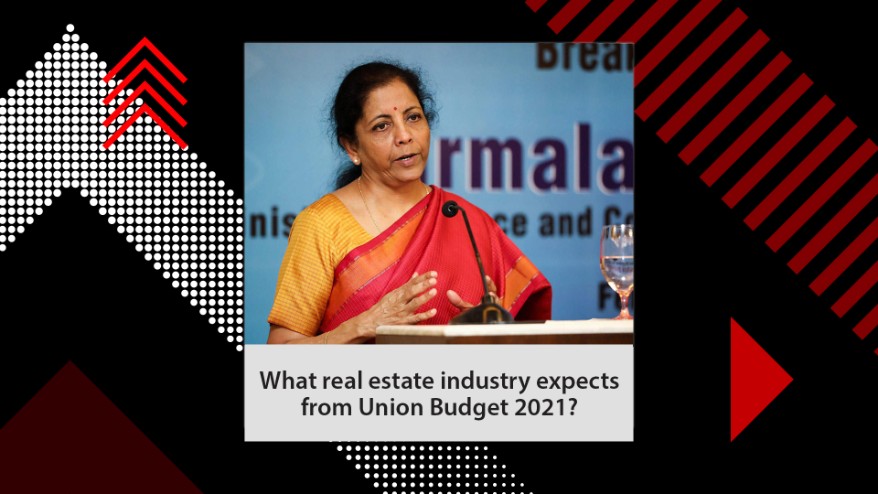The liquidity crunch being faced by the real estate sector needs to be resolved immediately.
The Indian economy showed humungous resilience and bounced back smartly after a sharp contraction of 23.9 percent in the first quarter of the current fiscal. (FY21).
After the adverse effects of the pandemic, the real estate sector has seen a steady recovery in the last quarter of 2020 backed by positive Government reforms, low interest rates and stamp duty reduction. Now, to sustain the momentum, a lot is expected from the upcoming Union Budget 2021
Warehousing
“The government has given a tremendous push to the warehousing sector through systematic reforms like implementation of the GST, accordance of infrastructure status to the sector, and mooting the National Logistics Policy. Demand for Grade-A warehousing is expected to increase consistently. Further incentives towards private and institutional investment in warehousing and logistics parks through tax benefits, streamlined compliance and strengthening last-mile connectivity via support infrastructures like roadways, interstate transport, and factory-to-port facilities, will greatly benefit the sector’s growth. These steps will not only generate employment but will significantly reduce logistics costs, which currently makes up about 14% of the GDP”, Anshul Singhal, Managing Director, Welspun One Logistics Parks
Infrastructure
“The Indian economy showed humungous resilience and bounced back smartly after a sharp contraction of 23.9 percent in the first quarter of the current fiscal (FY21). The next quarter saw a contraction of just 7.7 percent, according to the Economic Survey 2021. The growth in next fiscal (FY21-22) is projected to be a massive 11 percent, far more than what most other economies will see. “The momentum in recovery is strong and the government can do a lot to keep up the trajectory of growth, while the private sector is chipping in. The government can focus more on infrastructure which will have a multiplier effect on many sectors including the real estate sector,” said Amit Modi, Director, ABA Corp & President (Elect), CREDAI Western UP.
Affordable Housing
“Real estate sector has performed better than many industries even during the pandemic. The Government needs to give a little push by offering some more exemptions to the end consumers, who are driving sales for affordable housing. Government can increase the tax deduction under section 80C of income tax for Principal repayment on home loans. The Government should also focus on giving specific incentives to laborers in the real-estate construction industry”, Mr Honeyy Katiyal, Founder of Investors Clinic
Tax Exemption
“After the adverse effects of the pandemic, the real estate sector has seen a steady recovery in the last quarter of 2020 backed by positive Government reforms, low interest rates and stamp duty reduction. Now, to sustain the momentum, a lot is expected from the upcoming Union Budget 2021. Revising the tax exemption limit for individuals under Section 24 from Rs 2 lakh to Rs 5 lakh will help increase the purchasing power of the homebuyers. The sector hopes that they should also re-introduce GST with input tax credit on under-construction properties that will help in bringing down the cost of construction resulting in reduced property prices in the market. Furthermore, the sector expects a GST waiver for under-construction properties in the housing sector. These reforms will push the demand in the sector and ease the prevailing financial crunch”,Mr. Abhishek Jain, Chief Operating Officer, Satellite Developers Private Limited
Multi-Modal Logistics Parks
“There has been a thrust on the development of Multi-Modal Logistics Parks
Liquidity crunch
“The liquidity crunch being faced by the real estate sector needs to be resolved immediately. Although the government has announced the Rs 25,000 crore AIF for stuck projects, the deployment of these funds has been slow. It’s important to expedite the scheme. Currently, banks are hesitant to extend funding support to developers. The government needs to work out a mechanism to enable developers to receive funding from banks as it is crucial for completing the pending projects. The government also needs to consider the reintroduction of the subvention scheme”,Dhruv Agarwala, Group CEO, Housing.com, Makaan.com, and Proptiger.com
Income tax incentives
“Real estate sector needs support of the government wants every Indian to have a house. Escalating costs and delays are the biggest hurdles; government must step in through income tax incentives, to the developers, rightly priced land, availability of land in major cities for affordable housing, and so on. The list of expectations is endless because the goal is large – to provide houses to everyone in the budget that they can afford and still not compromise on the amenities or the deadlines given to the buyers”, Achal Raina, COO, Raheja Developers
Sustaining Revival Process
” The government must accelerate investment in infrastructure development in State Capitals and tier 2/3 cities so that these cities can emerge as the alternative centres for business and employment. India’s urban population is expected to grow to 590 million by 2030 and massive effort and investment in urban rejuvenation will be needed including from the private sector. The government must encourage private sector investment in these cities by opening avenues and providing tax breaks and incentivise in areas like real estate, IT, BPOs, retail, banks etc. Metro Rail, expressways, multi-land use projects, integrated townships, commercial and residential redevelopments are some of the areas the government must look towards”,Mohit Goel, CEO, Omaxe Limited
ALSO READ: Entra Urges Shareholders To Reject $4 Bn Takeover Bids: Norway


























